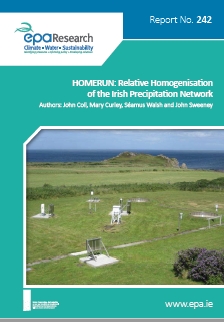Research 242: HOMERUN: Relative Homogenisation of the Irish Precipitation Network
Authors: John Coll, Mary Curley, Séamus Walsh and John Sweeney
Summary: Long instrumental records are rarely, if ever, homogeneous and most decade-to-century-scale time series of atmospheric data have been affected by changes caused by climatic and/or non-climatic factors. Nevertheless, accurate climate data are a prerequisite for basing climate-related decision-making on, and quality-controlled homogenised climate data are becoming integral to efforts across many countries to deliver climate services.

Identifying Pressures
A homogeneous climate time series is defined as one where variability is only caused by changes in weather or to the climate. Most decade to century-scale time series of atmospheric data have been adversely impacted by inhomogeneity caused by, for example; changes in instrumentation or observer practices, station moves, or changes in the local environment. Some of these factors can cause abrupt shifts; others gradual changes over time, which can hamper identification of genuine climatic variations or lead to erroneous interpretations. The increasing interest in climate modelling has also spurred the need for homogenized data in order to improve confidence in the observed series against which model simulations can be evaluated. In the work here we present selected results from two state of the art relative homogenization methods applied for the first time in Ireland.
Informing Policy
Accurate climate data is an essential prerequisite for basing climate related decision making on. Hence the provision of quality controlled homogenized climate data are becoming integral to efforts across many countries to deliver climate services. Such quality controlled and homogenised series will become one part of an envisaged delivery chain for endpoint data provision to the impacts and policy communities. Recognising this, there is already an identified need for Ireland to engage with the current EU Joint Programming Initiative Climate and Horizon 2020 initiatives in order that an entity or consortium to provide climate services can be provided. The work presented and ongoing collaborations extending the methods and scale of the network will deliver a repository of homogenous and robust precipitation time series to help inform future decisions in Ireland.
Developing Solutions
The modern relative homogenization methods applied to Irish precipitation data presented here have had limited application to observed precipitation data and relatively few results applying the methods to precipitation data have been published to date. Features of Ireland’s maritime climate and the dense network of quality controlled station data available lend themselves to the ongoing test development of relative homogenization methods such as HOMER and ACMANT. It is proposed that the work applying these and other relative homogenization methods to the excellent resource that Irish data provides should continue. This offers the win-win prospect of method development gains for the wider homogenization community and a spin-off for Ireland via the provision of high quality datasets for improved climate-based decision making and climate model evaluation.
https://www.epa.ie/media/epa-2020/publications/research/Research_242_thumbnail[1].jpg